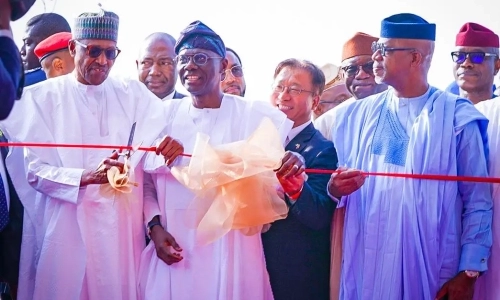COVER STORY THE EXECUTIVE 24/01/2023
Buhari Commissions $1.5bn Lekki Deep Seaport

President Muhammadu Buhari on Monday commissioned the $1.5 billion Lekki deep seaport for commercial operation.
The port which construction officially started on June 15, 2020, and was completed on Monday, October 24, 2022, was officially commissioned and set for full commercial operations.
The deep seaport, which is the first fully automated and digitalised port in Nigeria, would generate over $361 billion into the Nigerian economy as well $201 billion in revenue to Federal, State government agencies from taxes, royalties and duties.
Aside from providing over 200,000 job opportunities for Nigerians, the port would also improve turnaround time for cargo handling and clearance as well as effectively lower the cost of imports.
Speaking after Mr President unveiled the Lekki Deep Seaport, the governor of Lagos State, Babajide Sanwo-Olu, described the project as the biggest infrastructure in the whole of West Africa, saying it would generate thousands of direct and indirect jobs in the country.
This was just as he stated that the multi-billion naira project is a collaboration between the Federal Government and Lagos State government as well as the private stakeholders.
He expressed joy that the execution of the project which took off under Buhari’s administration was completed during his tenure.
“We are indeed excited that the project execution started during your regime and it is now completed during your tenure.
“At this port, a vessel will bring what four vessels will discharge at Apapa and Tin-Can Island ports. It is a big infrastructure that will generate thousands of direct and indirect jobs for Nigerians.”
He thanked Mr President for his commitment to the development of the country and appreciated all those who contributed immensely to bringing the project to reality.
Also speaking, the Managing Director, Nigeria Ports Authority (NPA), Mohammed Bello-Koko, said that having a depth of 16.5 metres will enable bigger vessels and more cargo to come into the port with economies of scale, which will bring down the cost of doing business in Lekki Port.
According to him, the port will not only create employment but will be more efficient than other ports in Nigeria and a model for port development in Nigeria.
He said that the NPA will be the regulator and had acquired the equipment needed for the provision of marine services for the safe berthing of vessels at Lekki.
“We already have interest from a certain neighbouring African country that wants to move its cargoes from Lekki Port through Dala Inland Dry Port in Kano to the African country because the country has seen the possibility of smooth operations and efficiency at Lekki Port,” he added.
Also speaking, the Executive Secretary, Nigerian Shippers’ Council (NSC), Hon Emmanuel Jime, disclosed that the Lekki Deep Seaport was a fully automated and digitalised port.
According to him, the Lekki deep seaports represent a dynamic change as far as the maritime domain of the nation is concerned.
“Lekki deep seaports represent a dynamic change as far as the maritime domain in our nation is concerned, the port is fully automated, digitalised and the implication for all of that is that the port will serve not only diligently but, as a port that will ensure the business is done seamlessly and the cost of doing business in this port will be the lowest ever,” he said.
“Lekki Deep Seaport be careful and watch out because the Shippers’ Council is coming, we will monitor every single efficiency, quality and indeed the kind of service delivered in the port,” he stated
Earlier, the Chairman of Lekki Port LFTZ Enterprise Limited, Biodun Dabiri, said: “From what I can see, in the next four to five years, the economy of the Lekki environs would be worth $25 billion which translates to N10 trillion, an investment amount almost similar to the whole budget of Nigeria.
“I can tell you that if we focus on this axis alone, the ranking of Lagos as one of the largest economies in Africa would be better; we could move from the 4th to 3rd, 2nd and eventually number one.”



